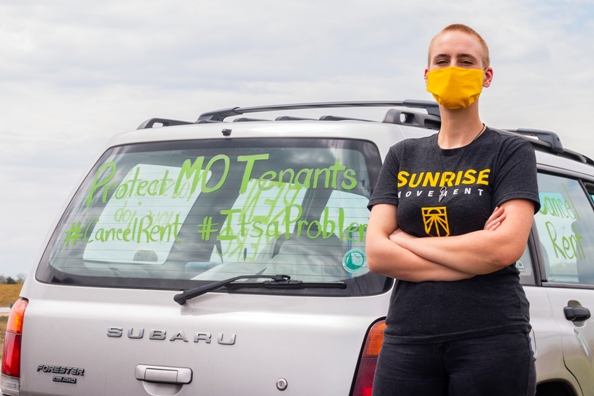“Coalition to Protect Missouri Tenants” stages I-70 demonstration for rent cancellation

The Coalition to Protect Missouri Tenants has issued a set of demands for Governor Mike Parson to stand up for tenants across the state in the midst of the COVID pandemic.
Tara Raghuveer of the group says, “He has done little in response to the housing/homelessness demands, saying only: ‘If it becomes a problem, we will look into it.'”
On Monday, April 20, 60 grassroots leaders parked along the shoulder of I-70, stretching from Kansas City to St. Louis, and stage a direct action to demonstrate the statewide crisis related to housing/COVID and to escalate pressure on Gov. Mike Parson.
The actions were captured on social media through #ProtectMOTenants and #CancelRent, as well as a digital action that will take place on kctenants.org/i70takeover.
Following is a complete list of the group’s demands, distributed in a Monday news release:
“Missouri is experiencing a public health crisis. COVID-19 affects and will affect people of color, and our poor and working class community members the most, only exacerbating the state of emergency we already endure every day. We can and must stand united to ensure the well-being of our whole community through this crisis. This will build a healthier and stronger Missouri for generations to come.
“People who are housing-insecure or currently homeless are at a higher risk of being exposed to the virus, becoming ill, and suffering catastrophic health outcomes. Low-income tenants are also at risk if they get ill and/or cannot work (because they’re monitoring symptoms, at risk, watching kids, etc.) and therefore can’t make their rent.
“We demand state action to:
* Institute a rent/mortgage suspension
* Enact an immediate, comprehensive statewide eviction/foreclosure moratorium
* Ban utility shut-offs and mandate universal service
* Provide homes and expanded services for people experiencing homelessness
“RENT/MORTGAGE SUSPENSION
Every month, millions of Missourians pay more than they can afford to keep a roof over their head. This public health emergency will exacerbate that stress, causing millions to face substantial financial loss. We must ensure people can stay in their homes, as a matter of public safety, by suspending rents and mortgages (we’re using the shorthand “cancel” to describe this).
“Rent/mortgage suspension: The Governor should institute an immediate rent and mortgage suspension for public and private properties, suspending rent and mortgage payments in full and for the duration of the crisis. No payments, no late fees, no debt. The suspension should last through the duration of the declared state of emergency and the entire recovery period. The policy should come with a fund for landlords to recoup losses, conditioned on a set of tenant protections.
“EVICTION/FORECLOSURE MORATORIUM
No one should be displaced from their home under any circumstances during this crisis. Many other state and local governments have implemented eviction/foreclosure moratoria. Kansas passed a statewide moratorium on 3/17.
“Eviction/foreclosure moratorium: The Governor should pass a statewide moratorium on all eviction proceedings, including filings, hearings, writs, and enforcement. Using the emergency powers of the Governor, this action should block law enforcement (sheriffs, municipal police departments, and all other relevant parties) from carrying out any evictions. The statewide moratorium should block non-renewal of month-to-month and all other leases during this time.
“Penalties for violators: Many landlords do not adhere to legal processes when evicting tenants. That behavior is even more cruel during times like these, and it should be duly punished. The Missouri legislature should determine severe penalties for banks, corporations, and individuals in violation of this moratorium, including but not limited to fines and/or loss of license to do business.
“UTILITY SHUT-OFFS BAN AND UNIVERSAL SERVICE
Utilities like water, gas, electricity, and internet should be provided as public goods, especially during a public health crisis.
“Ban on utility shut-offs: Missouri must follow the example of dozens of local and state governments by issuing a statewide ban on utility shut-offs during the pandemic. The Governor should use emergency authority to call for the ban, which should encompass water, gas, electricity, cellphones, landlines, and the internet. The ban should last through the duration of the declared state of emergency and the entire recovery period.
“Mandate for universal service: Beyond ending shut-offs, Missouri must compel localities and utility companies to restore utility services to all households, even if they faced shut-offs before the ban, and to expand them as needed to execute emergency precautions and communications. Water, gas, and electricity are critical for all households to remain safe and healthy at home. Internet must be provided, through emergency hotspots or other means, in every possible geography to ensure dissemination of accurate and timely information.
“HOMES, EXPANDED SERVICES FOR PEOPLE EXPERIENCING HOMELESSNESS
Tens of thousands of Missourians sleep on the streets every night. Those numbers do not account for the people who are un-housed, living out of cars, on couches, in shelters, or in motels. People experiencing homelessness are among the most vulnerable to COVID-19.
“The State must provide an infusion of resources to local providers for expanded homeless services. Local health departments, community health clinics, shelters, and other frontline service providers should receive this funding to cover staff overtime pay and hazard pay and necessary supplies, like sanitizers, medicine, masks, etc. Funds should go to organizations on a condition of commitment to equity and non-discrimination.
“End to sweeps: The Governor should issue an immediate moratorium on encampment sweeps, closures, and vehicle tows. Sweeps and other practices that criminalize homelessness pose a serious health risk, as they disrupt consistent access to services and the ability for outreach and health workers to provide continuous care.”



